Russia Recruiting Fighters In Syria Can Bring Iran Proxies To Ukraine
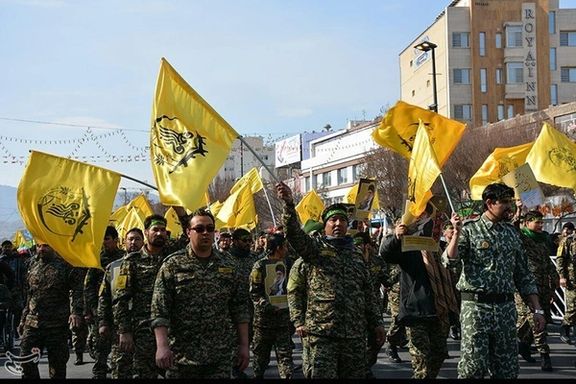
Russia is recruiting fighters in Syria to fight in Ukraine, The Wall Street Journal reported, a move that can bring Iran-backed fighters into the war in Europe.

Russia is recruiting fighters in Syria to fight in Ukraine, The Wall Street Journal reported, a move that can bring Iran-backed fighters into the war in Europe.
There are a myriad of groups fighting in Syria, including local persons fighting for Russia’s ally Iran and the Bashar al-Assad’s forces, the Lebanese Hezbollah, Afghan and Iraqi fighters recruited and paid by Iran, and Jihadist groups opposed to Iran and Russia.
The report, quoting US officials, did not provide details as to whether Syrian citizens are being recruited or foreign fighters. But if Russia has indeed decided it needs foreign fighters in Ukraine it might not hesitate to send non-Syrians recruited by Iran to Europe.
Iran entered the Syrian conflict from its early days in 2011 and in more than a decade has sent tens of thousands of Afghans, Iraqis and even Pakistanis to fight in Syria. In addition, the Iran-backed Hezbollah in neighboring Lebanon has been fighting in Syria alongside Iran and Russia for almost a decade.
Fighters in Syria not only have long experience in battle but many have fought in urban battles such as the capture of Aleppo from Assad’s opponents in 2016.
Other reports say that Moscow is also sending mercenaries from Russia to fight in Ukraine.
Many foreigners have also volunteered to fight on the Ukrainian side.
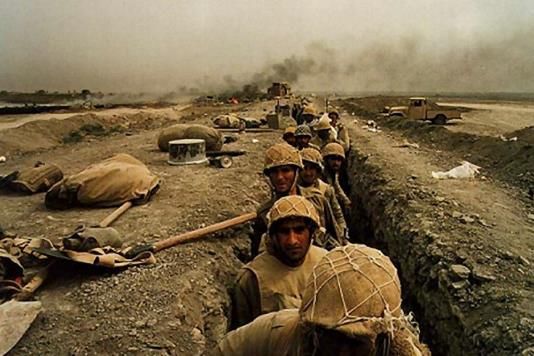
Iranians and veteran groups have slammed a plan by their government to provide assistance to Iraqis who fought in the 1980s war against Iran.
During his visit to Baghdad last week, the head of Iran’s Foundation of Martyrs and Veterans Affairs, Amir-Hossein Ghazizadeh Hashemi, signed a memorandum of understanding to provide a wide range of services to Iraqi veterans of the Iraq-Iran war and the families of Iraqis killed during the eight-year conflict.
The Iranian side will build homes in Iraq and set up a branch of Iran’s Shahed University to admit students from the families of Iraqi servicemen killed and veterans. The MoU is also set to pave the ground for the admission of Iraqis to universities in Iran.
Iran has been spending a lot of resources in Iraq to build influence.
Many Iranians have criticized the move, saying the Islamic Republic can barely provide the needed services for Iranian veterans and their families.
The Society of Devotees of the Islamic Revolution has issued a statement to condemn the agreement, questioning the justification for such a measure, and urging the resignation of Ghazizadeh Hashemi.
The society described the Iraqi veterans as “the murderers of the Iranian sons”, asking, “Have we really reached a point where the place of the murderer and the martyr has changed? When you are incapable of taking care of Iranian veterans, how have you announced readiness to provide such services to the Iraqis?”
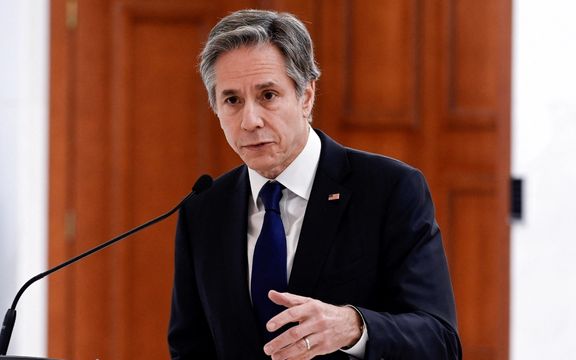
US Secretary of State Antony Blinken has dismissed Russian demands of guarantees that Ukraine sanctions would not hamper its relations with Iran.
Moscow’s demand was two pronged. First, it alluded to its ability to play its role in an imminent nuclear deal with Iran, and second to have economic and military ties with Tehran without being hampered by recent sanctions imposed for its invasion of Ukraine.
A day after Russian Foreign Minister Sergei Lavrov demanded written guarantees from Washington to that effect, Blinken said Sunday that the Ukraine sanctions have nothing to do with a potential nuclear deal with Iran.
They "just are not in any way linked together, so I think that's irrelevant," he said, adding that it is in the interests of both Russia and the US that Iran is not able to "have a nuclear weapon or the capacity to produce a weapon on very, very short order."
Lavrov said Saturday that international sanctions against Russia had created "problems from the point of view of Russia's interests" regarding the restoration of the 2015 Iran nuclear deal, Joint Comprehensive Plan of Action (JCPOA), and that sanctions on Russia could complicate Moscow's involvement in Tehran's civilian nuclear program as well as arms sales to Iran.
A European diplomat who spoke to Iran International in Vienna on condition of anonymity said Saturday that Russia’s demand of US guarantees over Ukraine sanctions not impeding its dealings with Iran go farther than Tehran’s nuclear issue.
Iran's foreign ministry, as well as other officials and government-run media have not shown any reaction to Lavrov's remarks yet but the Iranian delegation's media advisor, Mohammad Marandi, told Al Jazeera Sunday that Iran is "waiting for verification from Russians" about their demands from the US because "it's not quite clear exactly what the Russians mean".
The demand is relevant if it is linked to the actual implementation of the JCPOA, especially with regards to the Iranian nuclear program itself, Marandi said. "Because Russians play a role in resolving issues, they will be dealing with enriched uranium and other elements of the nuclear program."
Abolfazl Amuei, a member of the Iranian parliament's National Security and Foreign Policy Committee, said Sunday that Iran had not asked the Russian side to demand for guarantees from the US. “This is in fact something that Russia and the US must resolve between themselves because it is related with the relations between them in regards to Ukraine."
"Iran has made every effort to distance the Vienna talks from events in Eurasia, Eastern Europe and Ukraine developments. Therefore, Americans must be able to satisfy all parties' wishes on their own," Amuei said.
Some media in Tehran and many Iranian social media users interpreted Lavrov's remarks Saturday as "blackmail" and "taking the JCPOA hostage" to secure Russia's own interests.
Speaking to conservative Entekhab website Sunday, a former Iranian diplomat to the United Nations, Kourosh Ahmadi, said Russia may be aiming at delaying the restoration of the JCPOA and putting pressure on the West.
Restoration of the JCPOA at this time is not in Russia's interest because oil markets' need for Russian oil will decrease if sanctions on Iran are lifted and Iranian oil becomes available in international markets, Ahmadi said. "Oil prices will also drop by 10 to 15 percent. Therefore, it is in Russia's interest to delay the return of Iran's oil to markets as long as possible," he added.
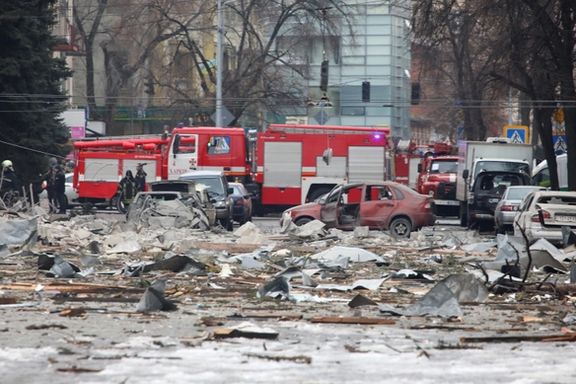
Iranian Communications Ministry said some 400 gigabytes of the country’s internet capacity was cut off due to the Russian invasion of Ukraine.
The public relations manager of the Ministry of Communications and Information Technology, Mehdi Salem, made the announcement in twitter on Saturday.
He said that according to the country’s network operations center, this “400 gigs” were provided by Russia’s largest digital services company Rostelecom through Ukraine and has been cut off since Saturday evening.
Salem added that since the network routes from Ukraine remain disrupted and takes a long time to reconnect, the ministry is seeking to establish alternative links through other international routes.
As Ukraine's internet service has been disrupted by Russia's invasion, Elon Musk’s company SpaceX has activated global satellite internet constellation Starlink for the Ukrainians.
Internet services on mobile phones and landlines were also disrupted Friday morning in the Iranian capital Tehran and the nearby city of Karaj.
The Iranian government has been blocking thousands of websites and top social media apps for years in a bid to control the flow of information.
Iranians were outraged last week when a group of 18 hardliners in a parliament committee claimed that they had ratified a bill to further restrict internet and social media access.
Some people reacted to the Friday disruption by blaming the authorities, saying the outage was a trial run for the plan to further restrict internet and social media.
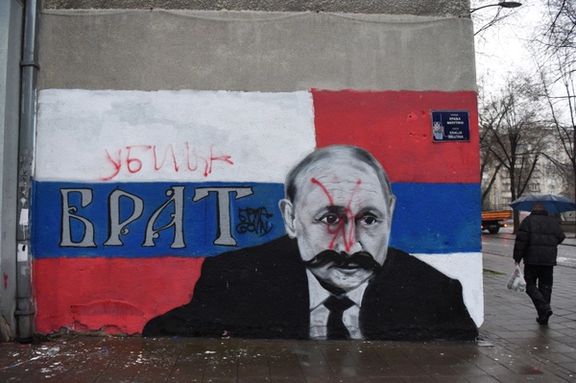
A former senior commander of Iran's Revolutionary Guard, IRGC, has called Russian President Vladimir Putin "a dictator" and his attack on Ukraine a “disgrace.”
Also, a well-known academic in Tehran says Putin is "unpredictable" and "has done more harm to himself than to those he considers his enemies." He has called on Iranian officials to distance themselves from Putin.
This comes while Iran's top officials’ including Supreme Leader Ali Khamenei and President Ebrahim Raisi have expressed support for the Russian invasion of Ukraine blaming the United States for the crisis.
Hossein Alaei, the former chairman of the IRGC joint staff (1997-2000) and commander of Iranian navy (1985-1990), has written in an article that although the war in Ukraine has so far served the interests of the US and China, it has caused a disgrace for Russia's “dictator Putin”. The article was published in Jamaran website, close to Iran's reformists and managed by Hassan Khomeini, a grandson of the founder of the Islamic Republic.
Alaei said that the war will last long with long-term implications for the people of Russia and Ukraine. He opined as a result of the war the people of Russia will look forward to an end to Putin's presidency.
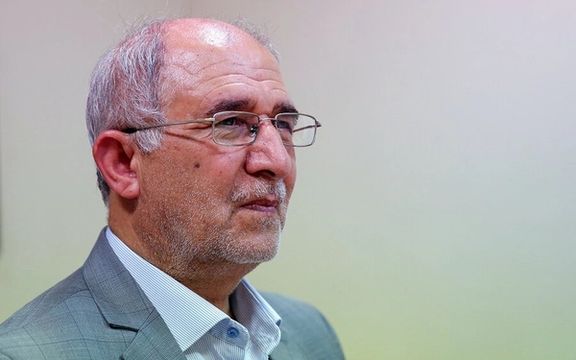
General Alaei stressed that ten days after the start of the war, Putin is now entangled in the quagmire of the occupation of Ukraine and cannot save himself from the trouble he has created. He added that thanks to the resistance by Ukrainians and the alliance of Europe and the United States against Russia, Putin finds himself in a tough situation. "Although it is too early to talk about the outcome of this war, one can imagine that it is a war of attrition to last for a long time," he added.
Assessing possible outcomes of Putin's action, Alaei said that despite the destruction of infrastructures and the displacement of nearly a million Ukrainians, reinforcement of Europe's military capabilities and solidarity between the EU and the US, as well as the expansion of NATO will be the consequences of this war. Meanwhile, Alaei warned that the Islamic Republic should understand and condemn Russia's aggression more than any other country as it has already experienced the Soviet Union's support for Saddam Hussain in his war against Iran.
In an Interview with the reformist daily Arman on Sunday, Iranian academic Pirouz Mojtahedzadeh called on Iranian officials to distance themselves from Putin. Mojtahedzadeh, a political scientist, quoted other academics as saying that Putin might even resort to using Russia's nuclear power if the conflict in Ukraine further intensifies.
However, he said Putin does not hold all the power in Russia and there are others around him who are watching his moves. They know that using nuclear weapons will do more harm to Russia than to other countries. However, he said that Putin has gone beyond the realm of logic and wisdom. He added that his behavior reminds everyone of former Iraqi dictator Saddam Hussain when he launched his invasion of Kuwait.
Mojtahedzadeh charged that Putin has lost his self-control under immense international pressure following the invasion of Ukraine. "I believe the sanctions imposed on Russia by the US and EU will destroy Russia," Mojtahedzadeh said, adding that, "Perhaps someone wishes to mess with the global balance of power. But this is no joke. No country can eliminate this balance."
Assessing Iran’s reaction to the war in Ukraine, Mojtahedzadeh said: "I have already warned that Iran should not look for unilateral relations with Russia and should prove this to the world by sticking to UN resolutions."
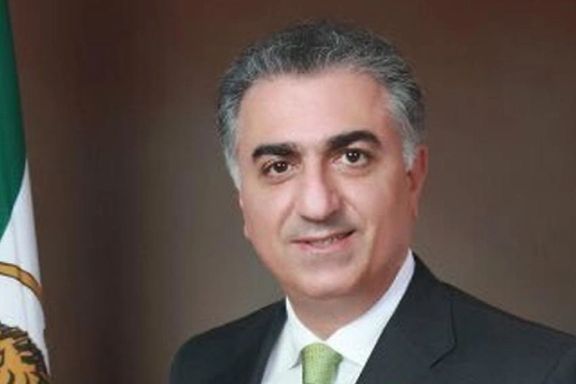
Iran's exiled crown prince Reza Pahlavi says Iranians stand in solidarity with Ukraine unlike “the dictatorial regime” of the Islamic Republic.
In a letter to Ukrainian President Volodymyr Zelenskyy, Pahlavi said that “the freedom loving people of Iran have defied regime threats and violence to protest the [Russian] invasion and show that they stand with the people of Ukraine”.
“While governments around the world rightly rally to your aid and people of every creed stand in solidarity with your own, the dictatorship in my country, Iran, has stood with those who have violated your territorial integrity and attempted to usurp Ukraine’s sovereignty”, he said.
Pahlavi added that the people of Iran “know the struggle of confronting a dictator as we stand up for freedom”, expressing hope that “when both our nations are free again, we will be partners for peace and prosperity”.
On Wednesday, the Islamic Republic abstained from voting for a UN General Assembly resolution deploring the Russian invasion of Ukraine.
Iran’s president and other officials have supported Russia’s move by blaming the United States and NATO for provoking the invasion.
Hundreds of Iranians on social media have been expressing anger at the invasion and criticizing the government’s position. Some are attacking Supreme Leader Ali Khamenei, calling him a lackey of Russia.